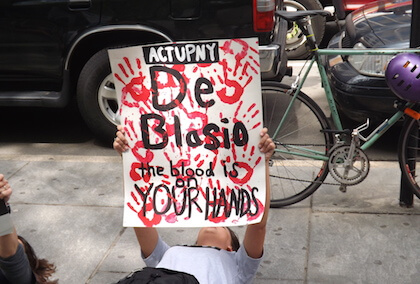State Senator Brad Hoylman. | DONNA ACETO
At least one New York City man who was in a recent cluster of three men who had meningitis was previously vaccinated against the bacteria, but may have had a reduced immune response because he is HIV-positive.
“We knew it was possible that some people, particularly those who are HIV-infected, could develop meningococcal disease even though they were vaccinated,” the city health department wrote in a statement. “We are not changing our recommendations [on vaccination]. We know that vaccination remains the best way to prevent meningococcal disease.”
This meningitis outbreak began in mid-2012 and ultimately infected 22 gay and bisexual men with a 23rd infection in a man who lived upstate, but spent significant time in the city. There were seven deaths. The outbreak was ostensibly ended in February 2013 with the health department estimating that “approximately 20,000 men received at least one dose of the meningococcal vaccine since the health department vaccination campaign began in 2012.”
Treatment Action Group, Brad Hoylman call on manufacturers to undertake larger clinical trials
The latest cluster of three cases in gay and bisexual men infected with the bug seen in the 2012 outbreak was announced on September 5. The department continues to recommend that sexually active gay and bisexual men get the two vaccine shots that are administered six to eight weeks apart.
A few studies have found a reduced efficacy in meningitis vaccines among HIV-positive children, adolescents, and young adults, but those were small samples. The Treatment Action Group (TAG), a health and AIDS advocacy group, and State Senator Brad Hoylman, an out gay Democrat who represents a district that includes a wide swath of the West Side and Lower Manhattan, have written to Novartis and Sanofi, two companies that manufacture and sell commonly used meningitis vaccines, asking them to support clinical research into the efficacy of the vaccines in HIV-positive adults.
Tim Horn, HIV project director at TAG, told Gay City News that the vaccines’ effectiveness may be near 80 percent after the two injections in an HIV-positive adult while the same vaccines are over 90 percent effective in an HIV-negative adult.
“That’s not terrible,” Horn said. “The problem is we just don’t know what the efficacy is in adults.”
In a meeting with city health department staff, representatives from Hoylman’s office were told that two of the three men in the recent cluster had been vaccinated, but the health department told Gay City News that just one of the three men had received the vaccine.
Another problem with the recent vaccine campaign is that not every person vaccinated may have returned for the second shot. Some of the vaccinations were delivered in sex clubs and the ability of doctors to follow up with those men would be limited, but even clinics and doctors’ offices might have a difficult time getting patients to return for the second dose.
“Getting people to return for follow-up vaccination has been a problem the world over with all kinds of vaccinations,” Horn said.
Getting just the first dose does offer protection, but two shots are recommended.
The need for the vaccination was emphasized by a city health department study published in January in the Annals of Internal Medicine, a peer-reviewed journal. Health department staff looked at 265 HIV-positive and HIV-negative New York City residents, aged 15 to 64, who had meningitis from 2000 to 2011. The study found the meningitis cases occurred at an annual incidence rate of 3.4 cases per 100,000 people in the HIV-positive sample and .34 cases per 100,000 people among the HIV-negative people.
“Our findings and those of the [Centers for Disease Control and Prevention] suggest that… [HIV-positive people] are at a higher risk for [invasive meningococcal disease] than the general population,” the study concluded. “Our sensitivity analysis…also produced an elevated [relative risk] and further supports the relationship between IMD and HIV.”
That finding of an increased risk for meningitis among HIV-positive people is consistent with a 1995 study from Georgia and a 2010 study from South Africa that also found an increased risk for meningitis among HIV-positive people.





































